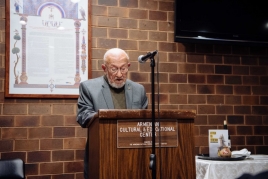Watertown Celebrates ‘Letter to Yerevan’
Wednesday, March 27, 2019
WATERTOWN, Mass.—Local Armenians recently celebrated the revival and first-ever English translation of Andranik Tzarukian’s 1945 epic longform poem “Թուղթ առ Երեւան” (“Tught ar Yerevan”).
“Something that was buried and dead has been resurrected,” said Letter to Yerevan translator and former ARF director Tatul Sonentz-Papazian in Armenian during his eloquent remarks in the lobby of Watertown’s Armenian Cultural and Educational Center (ACEC). Sponsored by the Hamazkayin Armenian Cultural and Educational Society Boston chapter, National Association for Armenian Studies and Research (NAASR), the Armenian Youth Federation (AYF) Greater Boston Nejdeh Chapter, Armenian Revolutionary Federation (ARF) Greater Boston Sardarabad Committee and the Hairenik Press, the book presentation welcomed about 100 guests and Armenian literature enthusiasts brimming with anticipation and support for the lauded translation of Tzarukian’s masterpiece.
WATERTOWN, Mass.—Local Armenians recently celebrated the revival and first-ever English translation of Andranik Tzarukian’s 1945 epic longform poem “Թուղթ առ Երեւան” (“Tught ar Yerevan”).
“Something that was buried and dead has been resurrected,” said Letter to Yerevan translator and former ARF director Tatul Sonentz-Papazian in Armenian during his eloquent remarks in the lobby of Watertown’s Armenian Cultural and Educational Center (ACEC). Sponsored by the Hamazkayin Armenian Cultural and Educational Society Boston chapter, National Association for Armenian Studies and Research (NAASR), the Armenian Youth Federation (AYF) Greater Boston Nejdeh Chapter, Armenian Revolutionary Federation (ARF) Greater Boston Sardarabad Committee and the Hairenik Press, the book presentation welcomed about 100 guests and Armenian literature enthusiasts brimming with anticipation and support for the lauded translation of Tzarukian’s masterpiece.
Rupen Janbazian, translator and former editor of the Armenian Weekly, was first captivated by Letter to Yerevan when he read it in high school 16 years ago. After connecting with Tzarukian’s important sentiments and conditioning himself to the writer’s decision to use a robust Eastern Armenian vocabulary, Janbazian knew that someday, this work would require an English translation, “so that my generation, which is much more comfortable reading English, could appreciate it as much as generations that came before us.”
As fate would have it, Janbazian would find himself working in the same building as Sonentz-Papazian 14 years later when he became editor of the Armenian Weekly. A native Canadian, Janbazian had long admired Sonentz-Papazian’s work from afar. Despite the generational gap, the two became instant friends. On May 28, 2017—the 99th anniversary of the First Republic of Armenia—they embarked on this important translation project together. The Hairenik Press, as part of its 120th anniversary, decided to publish Letter to Yerevan on Christmas Eve 2018—74 years to the day that Tzarukian sent his answer to Abov’s publisher in Soviet Yerevan.
In Watertown on Thursday night, Ida Barsoumian and Saro Sakaian, chair and vice chair of the AYF-Greater Boston Nejdeh Chapter, read excerpts from the book, alternating between the original Armenian poem to the English translation. Ahead of a traditional wine dedication ceremony, Rev. Archpriest Antranig Baljian of St. Stephen’s Armenian Apostolic Church offered his blessings and commendations. “Ever since the fifth century, the art of crafting words has become a very holy endeavor for Armenians, and we are so glad to see that continues today.” Then Der Antranig performed a “ginedzon,” pouring wine from a ceramic vessel adorned with the ARF’s symbol onto the pages of Letter to Yerevan.
Much like Letter to Yerevan’s contribution to Armenian literature, the Hairenik Association has embarked on a digitization project to create an online academic resource, digitizing the Hairenik and Armenian Weekly newspaper collection. Plans are in store to create an online archive of newspaper issues from as far back as 1936. All the book sale proceeds from Letter to Yerevan will be donated to this effort.
“The Armenian language is, without a doubt, central to our cultural identity,” noted Janbazian in his concluding remarks. In Armenian, he explained that instead of blaming today’s generation for neglecting their use of the Armenian language, which he says will turn them away even more from their Armenian identity, it’s more effective to find novel ways, like Letter to Yerevan, to re-establish that invaluable relationship and connection. Janbazian says these combined efforts can unlock a revolutionary spirit in the Armenian Diaspora and beyond. “In translation, those texts can again inspire, becoming for English-speakers what they were for previous generations of Armenians.”
https://armenianweekly.com/2019/03/27/watertown-celebrates-letter-to-yerevan/





